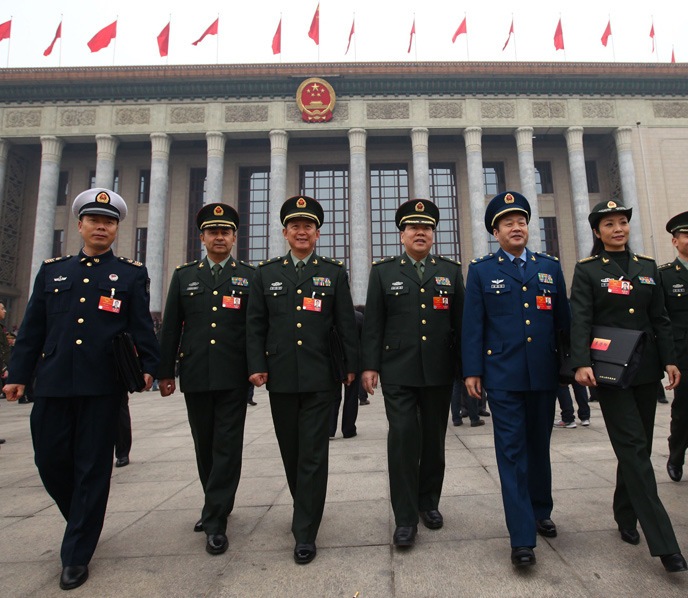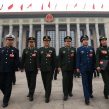
PLA Deputies Offer Clarifications of Military Intentions
Publication: China Brief Volume: 13 Issue: 6
By:

The annual National People’s Congress (NPC) meeting often can sound like a tedious recitation of familiar phraseology on Chinese priorities and, certainly, the words on modernizing the People’s Liberation Army (PLA) seem tired. On March 5, now-former-Premier Wen Jiabao delivered his final government work report to the NPC, reiterating the boilerplate language from the 2002 defense white paper on military modernization: “We should accelerate modernization of national defense and the armed forces so as to strengthen China’s defense and military capabilities…We should resolutely uphold China’s sovereignty, security and territorial integrity, and ensure its peaceful development” (Xinhua, March 5). Similarly, party General Secretary and Central Military Commission Chairman Xi Jinping restated the familiar set of priorities for the military, which is “building a people’s army that follows the Party’s command, has the ability to win battles and has a fine work style” (Xinhua, March 11). The military’s 268 NPC deputies, however, offered some welcome, if still modest, clarifications on key Western concerns about Chinese military modernization and recent press statements that have raised alarm in foreign media. The most important message, however, is that Xi has done nothing to suggest a departure from his predecessors’ military modernization policies.
Parsing the statements of the PLA deputies in Beijing suggests there were three key messages about the military. First, the military representatives addressed concern over another double-digit percentage increase to the PLA’s budget by stating the defense budget was commensurate with Beijing’s stated needs and, in one case, provided a little additional information on where that money would be spent. Second, PLA deputies placed the calls for “combat readiness”—which had alarmed foreign observers amid Sino-Japanese tensions in the East China Sea—within the PLA’s focus on improving the quality of its soldiers. Finally, other statements indicated the PLA is going global and faces a new set of challenges as it adjusts to the protection of Chinese interests overseas. None of these are wholly new, but the little variations upon official themes still warrant some attention.
Once again, Chinese officials deflected criticism of the PLA’s budget increases and the miltiary’s lack of transparency with arguments about China’s developmental status and international position. Deputy Director of the General Logistics Department Sun Huangtian noted “China’s defense expenditure has increased, but the defense budget share of GDP is only 1.3 percent, well below the international average of 2.5 percent” (PLA Daily, March 5). Sun also emphasized that China’s defense expenditure was compatible with the country’s “developmental interests” and “international position.” Separately, Chen Zhou, a senior researcher at the Academy of Military Science, described China’s defense budget increases over the last few years as normal given the international situation. As China’s economic strength and comprehensive national power grew, Beijing’s investment in defense has become more focused on its real needs. Previously, at least since the beginning of Reform and Opening, defense expenditures basically were at maintenance levels. Chen suggested the increases of recent years were compensation for this earlier neglect of national defense (PLA Daily, March 5). A PLA delegate to the Chinese People’s Political Consultative Conference and director of the PLA Navy’s Informatization Experts Committee, Yin Zhuo, added that China’s defense spending is properly transparent since it publicizes the information every year during the “Two Sessions.” Different countries count military spending in different ways with varying degrees of transparency, but none can be said to have achieved absolute transparency (China Military Online, March 12).
In spite of this downplaying of international concerns, Beijing did publish some information about what the PLA’s spending priorities would be for the additional $12.5 billion. The additional defense budget reportedly will be spent in four ways. The first is purchase and invest in high-tech equipment and support facilities. The second is to improve the logistics infrastructure with an emphasis on improving living conditions. The third is to reduce the pressure of rising prices on wages, although no further information was provided. The final is to build capacity in “diversified military tasks”—an outgrowth of Hu Jintao’s four “New Historic Missions”—especially counter-terrorism, disaster relief and stability maintenance (Xinhua, March 12). Depending on the nature of the high-tech equipment, this selection does seem to support NPC spokeswoman Fu Ying’s statement emphasizing “that China’s move to strengthen its national defense is only for protecting itself and safeguarding peace and security, rather than threatening other countries” (China Military Online, March 12). These clarifications, however, still leave gaps in how the PLA allocates funds among the different services or among the budget categories of personnel, operations/training and equipment.
The second message from the PLA’s NPC deputies was that the “combat readiness” phrasing that drew Western attention is not about recent tensions, but rather the continuing effort of the PLA to develop military talent. As one PLA deputy stated, “A military is either being in the fighting or being prepared for fighting. There is no third state” (China Military Online, March 8). Separately, a group army commander from the Nanjing Military Region, Han Weiguo, said soldiers “needed to remove ‘peacetime’ (heping shiqi) from their dictionary,” so they could better prepare themselves for the kinds of realistic training the PLA needed to be performing (PLA Daily, March 12). Li Danni, a deputy from the PLA Navy’s Submarine Academy, highlighted this need for a higher state of readiness to handle the rigors of PLA training and pointed toward future requirements. China’s national defense needs, Li said, required “not only the soldiers skilled in the operation of weaponry and equipment…but also the military strategists possessing a deep understanding of modern warfare and the talents in commanding joint operation to win the information-based war in the future are indispensable.” Second Artillery brigade commander Tan Weihong added that, in order for China to achieve Xi’s dream of national rejuvenation, “we have to depend on military talents who are capable of fighting and winning battles” (China Military Online, March 1). Feeding the PLA’s need for military talent, according to another PLA deputy, required cultivating a habit of studying. The President of the Naval Armaments Academy, Wang Yu, noted the commissioning of the aircraft carrier Liaoning and the successful carrier landing were realized because of such study, and he said “we should develop a habit of studying as naturally as breathing air, which is indispensable to life” (China Military Online, March 5).
The third theme of the PLA deputies’ remarks was that the PLA must orient itself toward meeting the challenges created by China’s growing interests abroad. This derives directly from another of Hu’s four “New Historic Missions” for the PLA to “provide a solid security guarantee for sustaining the important period of strategic opportunity for national development.” As a political commissar in the navy put it quite directly, “China has currently formed a pattern of being fully open to the world with highlighted issues regarding energy resources, oversea assets, strategic maritime channels and safety of overseas personnel together with new requirements proposed on safeguarding national security and interests. The Chinese armed forces and the Chinese soldiers must adapt to these new requirements and make their due contributions.” AMS’s Chen Zhou weighed in, suggesting a need to coordinate China’s national defense construction with economic development, “because of China’s increasingly complicated security context where international interests are more easily threatened” (China Military Online, March 11).
The need to be more engaged outside China’s borders also was related to developing the PLA’s quality to international standards, because the PLA has learned that exchanges and exercises with foreign militaries has improved officer quality. Another PLA deputy captured these interlocking reasons for going abroad perfectly when he noted the following: “It is imperative for us to go abroad in order to safeguard China’s national interests. Our military development also requires us to go abroad. ‘Going abroad does make a difference,’ that is what many officers and men strongly felt” (China Military Online, March 11). Comments by Major General Dai Shao’an, a senior military intelligence officer who was deputy director the Ministry of National Defense’s Peacekeeping Operations Office and the former military attaché in Egypt, believed modern PLA soldiers needed to have strong communication skills to take advantage of these international opportunities to learn from and study other advanced foreign militaries (China Military Online, March 11). This raises the question, however, of how the PLA intends to prepare its soldiers for these experiences and what educational reforms may be in order.
The hawkish comments of PLA pundits that draw most attention appear quite at odds with the more nuanced tones displayed by these more authoritative PLA representatives. While outsiders focus on the PLA’s improvements in warfighting capabilities, they often overlook the fact that increased PLA readiness also serves the purpose of deterrence and China’s preference for achieving its strategic goals without the use of deadly force. Echoing the ideas developed in The Science of Military Strategy, the missile brigade commander Tan Weihong also said “Only by keeping in the state of combat readiness like an arrow fitted to the string and ready to shoot, being able to fight and win battles, can we keep war at bay” (China Military Online, March 8). Even if China’s commitment to military modernization was not exactly surprising, the NPC has provided some themes in PLA development that observers should watch in coming years as well as some additional markers on Chinese intentions.
A special thanks goes to Dennis Blasko for his thoughtful comments.





